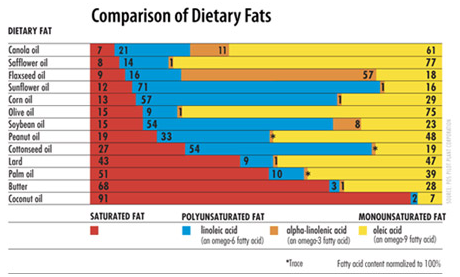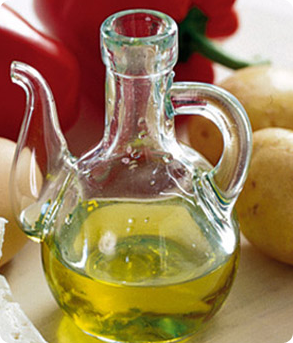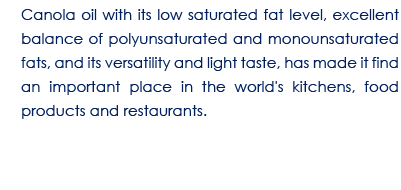
Canola Oil

Canola oil contains very high levels of heart-healthy monounsaturated fatty acids, which lowers bad cholesterol (LDL) and help control blood glucose.
Canola oil is rich in two fatty acids which a human body cannot make. Alpha-linolenic acid (ALA)/which is an essential omega-3 fatty acid. It protects against heart attacks and strokes by helping to lower bad cholesterol. Linoleic acid (LA) is an essential omega-6 fatty acid. This is important for the brain and for the growth and development of infants. The ratio of omega-6 to omega-3 in canola oil is 2:1, which is nutritionally ideal. Both of these fatty acids are polyunsaturated. Canola's heart-health claims are backed up by the US Food and Administration.
Canola oil contains valuable amounts of anti oxidants, Vitamin E, and is low on saturated fats. It has a high smoke point, therefore making it ideal for deep frying, with very little oil retention in food.
Eat Less Fat

This one dietary message for consumers around the world has not changed in a decade. This advice aims to help millions of people around the globe to reduce their risk of overweight, obesity and diabetes.
However a new message about fat has emerged - the type of fat in the diet is also important.
Your body needs fat to provide energy and help you absorb fat-soluble vitamins. Certain fats such as omega-3 and omega-6 fats are essential for good nutrition and must be consumed as part of a healthy diet. It is important to choose fats wisely because some fats are healthier for you than others.

The Real HERO!

Where does Canola oil come from?
Canola oil comes from the crushed seeds of the Canola plant. Canola is part of the Brassica family. Cabbages, broccoli and cauliflower are also part of this same botanical family. Each Canola plant grows from 3 to 6 feet (1 m -2 m) tall and produces beautiful yellow flowers. As the plant matures, pods that form are similar in shape to pea pods, but about 1/5th the size. Each Canola plant grows from 3 to 6 feet (1 m -2 m) tall and produces beautiful yellow flowers.
Once harvested, Canola seeds are taken to a facility where they are crushed to extract the oil contained within the seed. This oil is then further refined and bottled as Canola oil. Basic characteristics of this cooking oil include a pale golden color, light texture, neutral taste and high heat tolerance. The average Canola seed is 45% oil. The remainder of the seed, which is very high in protein, is processed into Canola meal and used as a high quality animal feed.
Canola is grown primarily in the Prairie regions, Ontario and the Pacific Northwest of Canada. Smaller volumes are also grown in the North-central and South-eastern United States.
Canola Oil Right For You
 Zero Cholesterol
Zero Cholesterol Trans fat free
Trans fat free Omega 3 rich
Omega 3 rich High on Omega 6
High on Omega 6 Source of Vitamin E
Source of Vitamin E Low on Bad Fats
Low on Bad Fats High on good fats
High on good fats
Canola oil does not contain gluten and therefore is suitable in a celiac or gluten free diet.

Cholesterol and trans fat free: Trans fat raises bad LDL cholesterol and lowers good HDL cholesterol.
It is the number one vegetable oil in Canada and Japan, while number two in Mexico and the United States. Overall, it is the third most consumed vegetable oil in the world.
Canola oil aids in the absorption of fat soluble vitamins A, D, E, and K. Canola oil also contains Vitamin E (1.9 mg in conventionally processed Canola) and K (115-220 ug per 100g). Vitamin E is an antioxidizing agent and may be a valuable tool in fighting cancer and heart disease. Vitamin K is vital for blood clotting.

